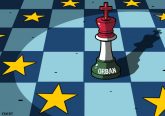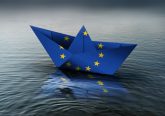
On August 22, 2012, German Chancellor Angela Merkel conducted an important one-day visit to Moldova to celebrate 20 years of German-Moldovan cooperation. Some of the key topics of discussion during her visit were a potential resolution of the Transnistrian conflict, triggered by the self-proclaimed independence of this Moldovan region in 1990 and suspended by the 1992 ceasefire, as well as Moldova’s integration into the European Union (EU). Indicative of the importance of this visit was the fact that the German Chancellor took part in the visit personally, rather than sending a lower ranking representative to address her Moldovan counterpart.
Most commentators who have analyzed Merkel’s visit have played down its importance, arguing it merely represents a strengthened effort to resolve the Transnistrian conflict. Such an evaluation is not borne out by an analysis of the event, since it was President Nicolae Timofti who raised this topic, by emphasizing that Russia should withdraw its troops from Transnistria. Merkel herself did not refer to solutions, prefer the 5+2 Mediation Talks, comprising Moldova and Transnistria as parties to the quarrel, Russia, Ukraine and the OSCE as intermediaries and the U.S. and EU as observers, to find a resolution to this frozen conflict.
According to the Carnegie Endowment, the interest of Germany, and indeed the EU as a whole, in the Transnistrian conflict stems from Moldova’s geographically important position at the EU border and the fact that unresolved and rekindled conflicts there could adversely affect the EU as well. This is undoubtedly an important consideration for the EU, particularly in light of Russia’s overnight intervention in the 2008 South Ossetian War, which generated refugee inflows within the EU and, as a result of the perceived weak response, brought into question the Union’s international authority and internal coherence. Moreover, the situation in Transnistria is important for the EU, because of Russia’s desire to maintain a direct influence over this Moldovan region, where it currently has troops stationed, as part of a strategy to prevent NATO’s expansion in the Black Sea region. Having its troops stationed in Transnistria also allows Russia to maintain control over the former Soviet region, which it regards as its sphere of influence, and to have a narrow foothold in Central Europe, also a worrisome prospect for the EU.
But, as the Carnegie Endowment hints at, the more important role of Merkel’s visit to Moldova is the EU’s need to test its relations with Russia, especially since Putin has regained the Presidential seat. Russia has been historically influential not just in Transnistria, but in Moldova as a whole. This influence is not as powerful as the one Russia claims over Ukraine, because there are not quite as many cultural and economic ties, but in many ways similar to it.
Moldova’s population is predominantly made of Romanian ethnics, some of whom continue to long for a reunification with Romania, with which Moldova decided to unite itself prior to Second World War. Economically Moldova does not possess important resources that could interest Russia, not does it enjoy the same important geopolitical and geostrategic position as Ukraine does.
Nevertheless, Russia has significant strategic interests in Moldova. Russia has already outlined its aims to create a Eurasian Union, an economic and political entity comprising many of the members of the former Soviet Union and centered around Moscow. This proposal, launched by Putin in October 2011, would primarily aim to increase Russia’s regional and international power. In this context, Russia has no interest in losing Moldova as a potential member by allowing it to tighten its relations with the EU. In economic terms, while the EU countries combined represent Moldova’s largest trading partner, with 50 percent of the share, Russia remains Moldova’s largest individual trading country. Russia has in the past used its economic leverage to strive and influence decisions in Chisinau, Moldova’s capital, and periodically places undeclared trade embargoes against Moldovan goods, in an effort to influence Moldova’s political decisions and force it to toe Moscow’s line.
In turn, the EU also has multiple interests in Moldova. In many ways, Merkel’s visit is a test both of Putin’s commitment to create the Eurasian Union, of which Moldova, just as Ukraine, would be inevitable members, and how it will react from now on to EU integration initiatives in countries, such as Ukraine and Moldova, which have made initial efforts to join the European Union. Moreover, Moldova lies on the EU’s border. Having some leverage and access to the country means, among other things, managing immigration and refugee flows, which remain key EU discussion topics.
Merkel played her cards well when deciding to focus on Moldova first, when testing Russia’s reaction. It did not take Russia long to react. On September 12th, 2012 during Moldovan Prime Minister, Vlad Filat’s two-day visit to Moscow, Russia invited Moldova to join the Eurasian Union, which is set to be established in 2015, while also offering the country low-priced gas and debt relief in exchange for denouncing the protocol on entering the EU Energy Community Agreement. This sends the EU an important message: Russia will not tolerate any unwanted interventions in its sphere of influence and that it will retaliate as it considers appropriate.
Sadly, in this process, Moldova has been caught between the interests of two much more powerful players on the international scene. If it had a stronger economy, this could have been quite an advantageous position. Being the poorest country in Europe gives it little leverage. Turning down Russia’s recent offers would inevitably be followed by harsh economic retaliation, while the EU remains non-committed in its relations to Moldova and is in many ways bound to Russia for its oil supply, despite its recent attacks on Gazprom. In turn, if Moldova were to accept Russia’s proposals, its relations with the EU would deteriorate and its EU integration prospects would be permanently shattered. Will the small Eastern European country be able to make the best use of its position and find adequate solutions? Who knows. The primary objective, however, is for Moldova to try to navigate these competing international interests and find the best long-term solution for its citizens.
Raluca Besliu is a masters student in Refugees and Forced Migration Studies at Oxford.







No Comment